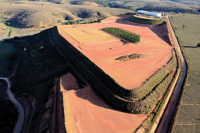So how does this trend affect members of the stone industry? In terms of large-scale stone production, the Natural Stone Council is working on an ANSI Dimensional Stone Standard for Sustainability. While this initiative focuses primarily on quarrying activities and larger processing plants, it is important that all members of the stone industry know that a sustainability standard for stone is in the works. That way, you have an educated reply ready when a homeowner asks, “Don’t they blow up mountains to make stone?” To read more about the sustainability standard and the Natural Stone Council, visit naturalstonecouncil.org and click the “Stone and Sustainability” link — or better yet, send your customers there.
But going beyond the stone industry’s efforts for sustainability on a global level, there are plenty of conservation practices taking place in local stone fabrication shops that should be promoted to consumers. Starting on page 42 of this issue, members of the Stone Fabricators Alliance discuss some of the green practices taking place in their operations — including the shop as well as the offices.
Water recycling is a common thread among the fabricators taking part in the discussion, and all of them have treatment systems in place. While this provides a practical benefit in terms of reduced utility costs, it should also be promoted to consumers as an example of running a green operation. “We recycle our water in a closed-loop system, so there is no discharge in the sewer or ground,” explained Carmine Pantano of Frank’s Marble & Granite in Red Lion, PA. “When we walk our customers through our shop, we explain the water treatment system, and they usually are very impressed by that.”
Another issue is the utilization of scrap stone, and several of the fabricators taking part in the discussion had specific ways of addressing the issue — from crushing material for aggregate uses to using scraps as pavers, stepping stones and even a statue base at a local memorial.
Company vehicles are another very public way for a fabrication shop to show that it is environmentally friendly. One of the discussion participants pointed out that his diesel trucks get superior fuel economy and burn ultra-low sulphur diesel fuel for a cleaner burn and less pollution. Another uses two Smart Cars for its measuring team to travel in. This not only saves fuel costs for the owner, but the brightly decorated vehicles (see page 44) advertise the shop and scream “eco-friendly” to anyone who sees them.
I’ve said many times before that most fabrication shops seem hesitant to toot their own horn, and it seems that is the case when it comes to promoting green practices. “Unfortunately, we do not convey this type of information to our clients — yet,” said Dan Riccolo of Morris Granite in Morris, IL. “This discussion certainly has made me realize that we do a great deal involving the green movement than I initially realized. I think we can use this to our sales advantage.”
His comments would likely apply to most of the fabrication shops out there, and it is time to start promoting your green practices, and as Riccolo said, use them to your advantage.



